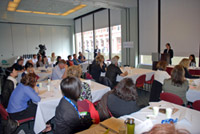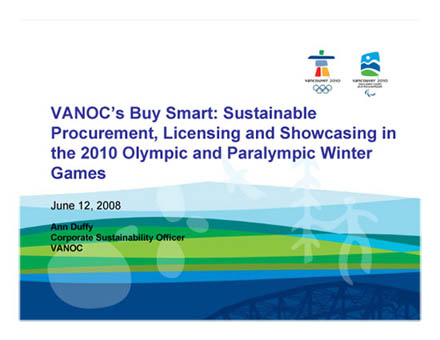WELCOME TO THE ARCHIVE (1994-2014) OF THE MAQUILA SOLIDARITY NETWORK. For current information on our ongoing work on the living wage, women's labour rights, freedom of association, corporate accountability and Bangladesh fire and safety, please visit our new website, launched in October, 2015: www.maquilasolidarity.org
June 24, 2008

On June 12, approximately 60 representatives of major sportswear brands, international and Canadian trade unions, the Olympic movement, and faith, student, human rights, corporate social responsibility, and social investment organizations came together in Vancouver to discuss and debate proposals to make the 2010 Olympic Games sweat-free.
Speakers at the Ethical Trading Forum, entitled “Igniting the Flame for a Sweat-Free Olympics,” included representatives of Nike, the International Textile, Garment and Leather Workers' Federation, the Vancouver Olympic Organizing Committee, Labour Action China, UNITE HERE, the BC Federation of Labour, and MSN.
Issues discussed at the forum included:
The Ethical Trading Forum was co-sponsored by: BC Federation of Labour, Canadian Labour Congress, Ethical Trading Action Group, New Westminster & and District Labour Council, Vancouver & District Labour Council.
Jim Sinclair, President of the BC Federation of Labour, opened the forum by highlighting the power of ethical purchasing policies to improve respect for labour rights and the environment and VANOC's failure to meet the “gold standard” of ethical purchasing policies.
“They would never be allowed to hand out a gold medal to someone who won a race if no one could see them race. It would never happen. So why would we allow them to have an ethical purchasing policy that says they can decide it's ethical, someone can go analyse that, and we don't get to see it, read it, or hear about it? The first thing about ethical purchasing is that it's transparent.”
- Jim Sinclair, President, BCFL
The first panel focused on findings and proposals from the international Play Fair Campaign's industry report, and implications for the Vancouver Olympics.
Kevin Thomas, Director of Advocacy for the Maquila Solidarity Network, laid out the general findings of the report and some of the steps the Vancouver Olympic Organizing Committee (VANOC) has agreed to take to address labour rights issues with their licensees and suppliers. He also pointed out some of the weaknesses of the VANOC program and steps to develop ethical licensing practices at the VANOC, Canadian Olympic Committee and International Olympic Committee levels.
Download this presentation as: PowerPoint | PDF
Doug Miller, Inditex/ITGLWF Professor of Ethical Fashion, University of Northumbria, spoke about the international Play Fair 2008 campaign. He drew attention to a series of targets set out in the Play Fair industry report that sportswear brands and manufacturers should be required to meet prior to the 2010 and 2012 Olympic Games. He pointed out that in July, 2008, Play Fair campaign organizations will be meeting with major sportswear industry players in Hong Kong to discuss the targets and how to make serious changes in labour practices in the industry. He told participants that a sectoral approach is necessary because control over labour conditions is dispersed between brands, manufacturers, governments and workers. He also noted that while VANOC's ethical licensing program has broken new ground for the Olympic movement, it could still be improved.
Download this presentation as: PowerPoint | PDF
Ann Duffy, Corporate Sustainability Officer for VANOC, spoke about VANOC's “Buy Smart” ethical licensing and purchasing program. She set out the sustainability objectives outlined by VANOC and how they were being incorporated into various aspects of the Games organizing. The BuySmart program includes not only a Code of Conduct for labour rights, but efforts to identify and reward leadership in aboriginal employment, environmental performance and social benefits to the local community. She noted that this program was a first for Olympic Organizing Committees. Duffy explained that there have been improvements to the program following initial consultations with ETAG and other groups, including strengthening the hours of work provisions of the VANOC Code. She said, however, that ETAG's demand for full public disclosure of factory locations was not possible within the current program time-frame, noting that licensees were concerned about releasing what they see as competitive information.

Download this presentation as: PDF